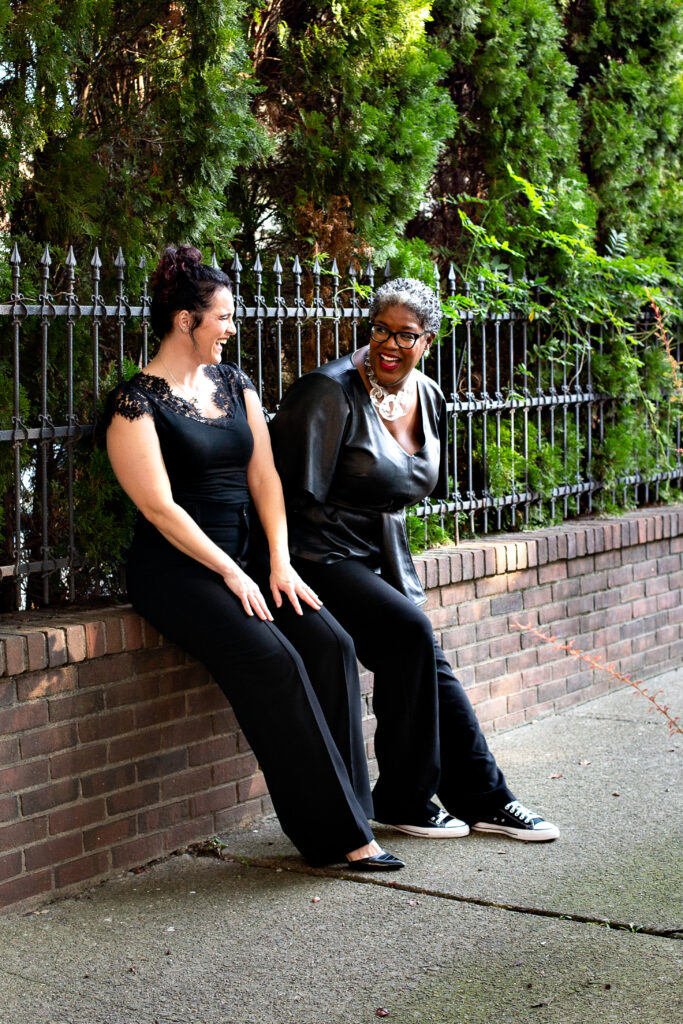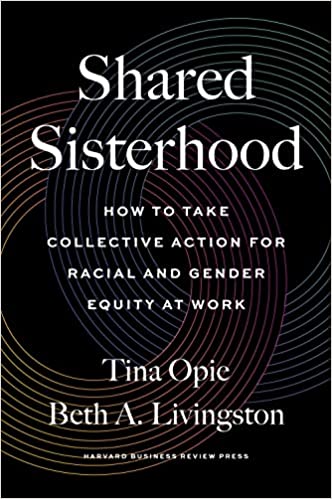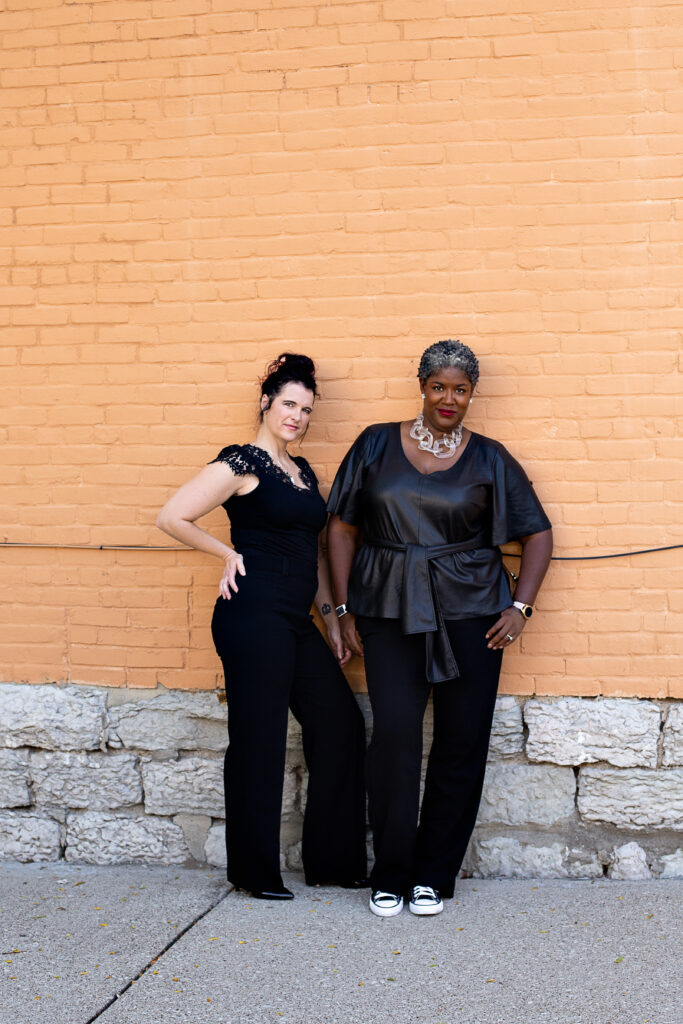Photo Credit: Megan Hile
When Tina and Beth met, it wasn’t love at first sight. Tina, a Black Christian woman and Beth, a White atheist woman both had to navigate many identity barriers. If we’re honest, such identity barriers prevent many of us from truly seeing each other and connecting. Yet, somehow, in some way, Beth and Tina developed a deep connection, a Shared Sisterhood based on trust, vulnerability, empathy, and risk-taking?
Dr. Tina Opie is an Associate Professor of Management at Babson College, a well-regarded thought leader in the field of organizational behavior and a professional speaker. Her research centers on leadership, culture, diversity and gender. She is the founder of Opie Consulting Group LLC, where she advises firms on strategies to create more inclusive and productive cultures. Her research has been published in multiple, peer-reviewed academic journals and has been featured in such outlets as Bloomberg, NPR, O Magazine, The Washington Post, The Boston Globe, and Harvard Business Review. Dr. Tina is a regular commentator on Harvard Business Review’s Women at Work podcast and Greater Boston’s NPR affiliate television station WGBH.
Dr. Beth Livingston is the Sheets Associate Professor of Industrial Relations at the University of Iowa’s Tippie College of Business. She received her PhD from the University of Florida (2009) and her MBA from the University of Kentucky (2004). Her research centers on gender, diversity, and work-family management. Her work has been highlighted in the New York Times, NPR, and the Harvard Business Review, and she has been published in multiple top academic journals
FWM: Beth and Tina, did you ever think you would be sitting together and standing together in Sisterhood while creating more inclusive environments and to bridge differences in the workplace?
Beth: I have always been an optimistic woman–I have usually joked that I tend to see the glass as half full, and full of sparkles. I think I had hoped we would be able to come together to create something that could make the world a better place. But at the beginning, it took more time for us to become closer and trust one another. I had to be willing to work on myself and work on our relationship to build the Sisterhood that I hoped we could build.
Tina: for as long as I can remember, I’ve felt that building bridges between different communities was part of my God-given purpose. The vision of a more peaceful and equitable world motivates me to do the work that I do that we do, and that vision spurs me on, especially during the difficult times.
FWM: Beth and Tina, tell us about your backgrounds.
Beth: I grew up in Louisville Kentucky as the youngest of three children, and the only daughter. I started studying marketing and communications before I got my PhD in management. I became focused on gender and racial inequalities in society and wanted to do all I could to learn about them. I met Tina when we were both in graduate school at different programs, and we built our relationship from there.
Tina: I am the daughter of Robert and Clara Pittman. My mother was a sharecropper, she joined the Marines to achieve a better life. My father was raised by my grandmother and he joined the Navy to take care of her and his many siblings. That made me a military brat. I’ve lived in the Philippines, California, and Virginia as a result of my travels. I was often a newcomer, and it was important for me to learn how to navigate new environments. I think that that inspired a desire for me to understand how to connect with different people.
FWM: Tina, how did Shared Sisterhood come about?
Tina: I’ve worked in banking, consulting, academia, and entrepreneurship. In each of those fields, I have wondered why, if feminism is real, haven’t black and white women done more to help each other? I’m married to a historian, Dr. Frederick, Douglass Opie, and so there are many history books around our home and I began to read on the history of the workforce, and I realized that historically it’s just a deep lack of trust, and that in order to bridge the communities, they would need to be much more trust and understanding.

Photo Credit: Megan Hile
FWM: Tina, Shared Sisterhood is based on 3 practices. Dig. Bridge. Advance. Please explain.
Tina: dig is introspective it’s about surfacing your assumptions beliefs about particular identities. For example, when did you learn that you were black or white? How do you feel about your blackness or your whiteness? Where did those beliefs come from? How did those beliefs affect how you see the world? How do you see other people? How do you navigate the workplace? Bridge is about developing authentic, interpersonal connections with people who are different than you, where you center the value of equity. The authentic interpersonal connection is based on four factors: empathy, trust, risk taking and vulnerability. Finally, collective action is about linking arms and together dismantling systems of inequity.
FWM: Beth, what does Sisterhood mean to you?
Beth: To me, Shared Sisterhood is the bridging of differences in order to make the world a fairer, more just place. It is not just having a friend, but it is about building a relationship where you know they will have your back when you’re not in the room, and that they share your values of equity and justice. And, importantly, Shared Sisterhood is inclusive of anyone, regardless of gender, but it recognizes that the methods of connecting that are often linked to being a woman–talking, empathizing, demonstrating vulnerability–may be the most effective way to build lasting and world-changing relationships.

FWM: Tina, How important is prayer?
Tina: prayer is a conversation or talking to God. It is an extremely important practice because it helps me understand what I’m really thinking and feeling. During times of prayer, I also meditate on Bible scriptures, and in those quiet times, I often find direction. For me, some of the critical ideas in my life, for example, for Shared Sisterhood, came about during times of prayer. I get tremendous direction and guidance from God through prayer.
FWM: Beth and Tina, What did you learn about yourself when writing your book, Shared Sisterhood: How to Take Collective Action for Racial and Gender Equity at Work?
Beth: I learned a lot about the power of collaboration. I always loved talking with Tina, but working on this book required a level of humility and vulnerability that allowed us to build something truly special. The book has become a physical manifestation of our relationship, which I will always treasure.
Tina: I agree with Beth. Writing Shared Sisterhood with Beth was truly a labor of love. We didn’t always agree when writing, and we learned how to communicate through our disagreement and develop tighter, more cohesive arguments for the book, and I think that readers will benefit from our strengthened collaboration.

Photo Credit: Megan Hile
FWM: Beth and Tina, how have your lives improved through shared sisterhood?
Beth: There is no better feeling than to see your work and your words help improve someone’s life. Seeing the people who have read the book and put Shared Sisterhood into action and hearing their stories of vulnerability and connection feeds into the radical optimism that led us to write it in the first place.
Tina: I have talked about the fact that I came up with the idea for Shared Sisterhood before I met Beth. But the white paper back then that I wrote by myself was not good. Haha! In order to write about Shared Sisterhood, I needed a Sisterhood to develop it, and Beth is that sister. It feels wonderful to develop an idea in collaboration with someone and have a relationship that truly embodies the principles of Shared Sisterhood.
FWM: Tina and Beth, what is your mission through your work?
Tina: most of my work is focused on liberation. I want everyone to experience, liberation, body, mind and spirit.
Beth: The mission of my work is to improve the world around me, little by little (or a lot by a lot!) through compassion, kindness, and collaboration.


